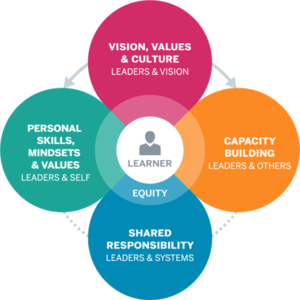 #16 of 60: Learn, unlearn, relearn: How do we rethink leadership to meet the needs of learners and society? 🤔🤔🤔
#16 of 60: Learn, unlearn, relearn: How do we rethink leadership to meet the needs of learners and society? 🤔🤔🤔
In yesterday’s post we explored rethinking the role of teacher. In this post, you guessed it, we take a look at some work being done to rethink the role of leadership in human-centered environments.
In 2017 (which seems like ages ago!) we saw published Leadership Competencies for Learner-Centered, Personalized Education. Here is the blurb from the website: 🗨
The Leadership Competencies for Learner-Centered, Personalized Education (Leadership Competencies) serve as a first step in identifying the knowledge, skills, and dispositions leaders must master in order to build and sustain learner-centered, personalized schools and learning environments. Outside of the education world, many of the themes in the Leadership Competencies reflect a larger movement across numerous industries and sectors—from high-tech to health care to nonprofits—toward a continuous improvement approach, shared leadership, and greater transparency. The authors and our many contributors hope these competencies serve as a helpful step toward building present- and future-focused systems of education in which each student can fulfill their learning potential and head into postsecondary life ready to succeed in their careers and communities.
As was done with the Educator Competencies, I wonder if we will see an update soon to the leadership competencies.
Couple of observations about the Leadership Competencies:
First, the various domains are rooted in a clear understanding of the principles of learner-centered education. The four specific “research-backed practices” come from earlier work (2013) of Jobs for the Future:
* Personalized
* Competency-based
* Anytime, anywhere
* Student-owned
You’ll recognize these from similar frameworks shared by Education Reimagined and Education Evolving. Once again, it’s pretty clear how learner-centered education is being framed. There are agree-upon, defined principles that can anchor discussions with our stakeholders around school transformation.
Second, I’m drawn to the domain focused on Personal Skills, Mindsets and Values. One thing we know from systems thinking is that the changes with greatest leverage are system structures and mindsets. (Also the most challenging to change!)
And the Leadership Competencies help us think about new skills, mindsets and values beyond traditional “good leadership”…
Focus on knowledge, mindsets, and skills that go beyond general “good leadership” practices to emphasize areas that comprise successful approaches in transformational, rigorous, learner-centered, personalized settings. Many existing standards and frameworks for education leaders include strong practices that are applicable in all settings.16 Rather than reiterate these fundamentals, this framework highlights the specific competencies that are most applicable—and essential—to leadership in the distinct context of learner-centered, personalized environments in the midst of a constantly evolving field.
—–
❓ Provocations:
In what ways do the Leadership Competencies speak to you? Why is that important to you?
💎 Resources:
Leadership Competencies for Learner-Centered, Personalized Education
Podcast with Rebecca Wolfe, lead author
🧠 Mindset:
Leader as human-centered learning experience designer
💡 Area:
Leadership
📣 Drop your thoughts in the comments, or in the Facebook group, and feel free to share resources. 🔥🔥🔥
- A silver lining - January 22, 2022
- Is our use of tech working against us? 🤔 - September 8, 2021
- What’s NOT going to change in the next 10 years? 🤔 - September 7, 2021